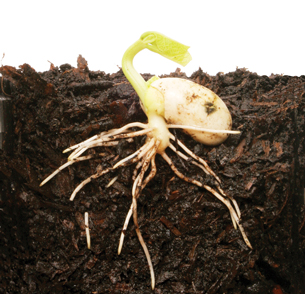"And he spake many things unto them in parables, saying, Behold, a sower went forth to sow;
And when he sowed, some seeds fell by the way side, and the fowls came and devoured them up:
Some fell upon stony places, where they had not much earth: and forthwith they sprung up, because they had no deepness of earth:
And when the sun was up, they were scorched; and because they had no root, they withered away.
And some fell among thorns; and the thorns sprung up, and choked them:
But other fell into good ground, and brought forth fruit, some an hundredfold, some sixtyfold, some thirtyfold.
Matthew 13:3-8

DON'T PLANT TOO DEEP.
In the teacher's chair, in the Bible-class room, in the superintendent's desk, and in the pulpit, there is always danger of over-heaping soil on the seed of truth. Too much comment may kill out the life of the text. To begin with, he who sows must have clearly in mind the distinction between the seed and the soil. "The seed is the word"-God's word, not man's thought about that word. That word needs to be handled as seed. It should be planted with judicious care, and not over heaped with soil of any sort.
Soil is necessary. Planting below the surface, by a stimulating question, or a suggestive remark, or a helpful illustration, is better than broadcast sowing on the bare and hard earth. But, after all, the seed is the chief thing-not the soil. Yet there are teachers and superintendents and preachers who take one or two grains of good truth-seed, and then devote themselves to shoveling earth upon it until the seed is buried out of sight and hope forever. The seed was good enough, but it was killed in the planting.
In all attempts at planting the seed of God's word, in class, or school, or congregation, "there is good reason for the old rule, not to plant seeds more than five times their diameter in depth." Not the covering soil, but the lightly covered seed, gives the hope of a harvest, in any planting. If we are to reap where we have sown, we must choose well our seed, must-plant it wisely, and must resolutely refrain from crushing out its life by what we heap above it-merely because soil is abundant, and we enjoy shoveling.
H. Clay Trumbull.
IN estimating the value and success of a Sabbath-school in its field of work, the true test is not in the numbers gathered in, but in the gain secured to those who are gathered in. It is far better to have a small school well managed and well instructed, than to have a large school loosely managed and poorly instructed.
The growing roll of scholars may be a sign of inefficiency-especially if the roll grows in holiday season under the temptation of proffered gifts and rewards to the scholars. And again, a diminishing roll may be a proof of larger efficiency, through the raising of the school standard, and the consequent dropping off of teachers and scholars who are unwilling to conform to that standard. How much gain is made by the teachers and scholars who remain in our Sabbath school? is a far more important question than, How many teachers and scholars can be induced to remain in our Sabbath school
S. S. Times.